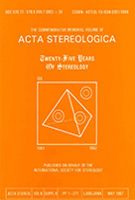Experiences on the use of the disector principle in neuropathology
Abstract
We used the disector principle in studying the pars compacta of the substantia nigra in control cases, following the principles of Pakkenberg et al. (1991). On the theoretical side we were much helped by the formula of Ebbeson and Tang, which is a mathematical representation of the disector principle. In comparing the images of the test (the disector proper) and the reference section we used two microprojectors; the images were projected side by side on a table. We noted a number of potential problem areas in applying the system. The embedding of the tissue in and cutting of the sections from several blocks necessarily results in some, but probably insignificant, loss of material. Outlining of the pars compacta was problematic because it was not easy to do this accurately, and the human hand was shaky. If the area measurement is made with the help of the counting frames, one can determine the border of the counted area accurately, but overlaps or gaps between the frames need be carefully avoided. After a training period for an unexperienced user the disector principle works quite well in practice. Biased results in this kind of disector can be caused by the overlap of cells, especially in tissues with high cell density.

